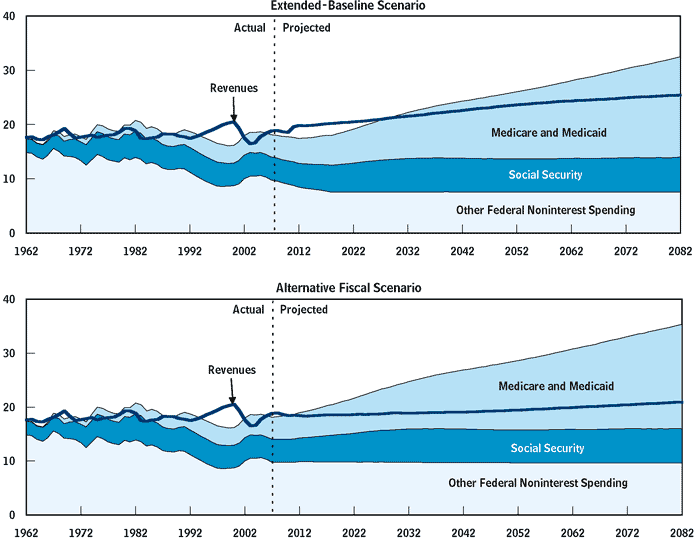Debating Health Care
Tyler Cowen has an interesting post on health care that lists a number of interesting facts/points about the health care debate.
Two of his points stuck out for me. The first is,
American’s high expenditures, however wasteful they may be, nonetheless drive much of the world’s medical innovation. Medical innovation is also a public good to some extent and no the pharmaceutical companies are not simply parasites on the NIH and universities.
This is a great observation. Innovation in general has many characteristics similar to that of public goods. Thus, what appears as socially wasteful expenditures might actually be necessary to ensure a level of innovation that is closer to optimal. Further, the idea of using the coercive power of the State to reduce prices could act as a disincentive to innovation. Less innovation could lead to the outcome of more unneccessary deaths.
The real kicker though was this observation,
The major Democratic health care plans on the table all, one way or another, admit they will spend more money on health care. The fact that other countries spend less therefore does not help predict the change in spending that would result from these plans.
An excellent point in that supporters of the various democratic plans all invoke the dubious “fact” that other countries with some sort of government provided health care get better results for less money. If this is true, how come every health care plan by the Democrats will have to cost more money? If it is so easy to get better health care outcomes and also reduce expenditures how no Democratic plan works this way?
In regards to the latter, my guess is because even if we switched to any system used by any other country we’d still end up spending more than any other country…at least for awhile. It my very well be the case that the reason why life expectancy is lower in the U.S. is due to reasons un-related to health care expenditures. For example, Americans tend to drive more than most European countries. If we controlled for things like miles driven or hours in the car what would happen to life expectancies? Would they move closer or would they diverge further.
Also life expectancy seems to be, at least in part, a function of race. The U.S. is quite diverse in terms of race, so shouldn’t we control for race as well? And if we do this, what happens to life expectancies between the U.S. and other countries, do they diverge or converge?






I’m not so sure of this, Steve, or, more specifically, I think that whatever differences there may be attributable to race are more than swamped by those attributable to other factors like income, education, urban residence, drug use, etc.
If you don’t understand that the basic idea is that the expanded cost to government would be offset by similar or greater reduction in inefficient private coverage, I’m not sure how anyone can have a reasonable debate with you.
You can argue over whether or not this will actually happen, but pretending that this isn’t the basic idea is just sort of weird.
The article doesn’t give citations for any of its assertions. Could you supply citations at least for the ones you choose to use?
A study co-funded by the US National Institute on Ageing comparing UK and US controlled for race and came away with the same results (better health outcomes in the UK). This same study also found that American’s higher prevalence of obesity and lower level of exercise could not account for the better health of middle aged UK citizens in the study. (cite lifted from comments section of the article you cited)
I am guessing that questions raised in earlier health care posts will remain unanswered.
Andy, the best study I could find of costs (from JAMA) found that insurance companies account for at most 31% of the total costs of healthcare. Several questions:
1) How much do you think that could be reduced by? I think a prudent estimate would be half or 15%.
2) How much more do you think that universal coverage will cost? I think a prudent estimate would be 20% (based on 20% of people not currently covered).
I don’t know. I assume the candidates do have numbers that back them up. That’s my only point, that presumably there is an argument to be made along the lines of increased government costs being offset by improved efficiencies and reductions in private expenditures.
You numbers are part of the reasonable debate about whether or not these plans are a good idea (or not).
(I happen to think that tying healthcare to employment is a serious economic problem that significantly reduces labor market flexibility. So, I think that some sort of pooling, whether government subsidized or run is a reasonable solution.)
More money than what? I have a hard time believing that Andy’s reading is right (could such an obvious point have been missed? That’d be a mighty whiff, worthy of Mudville), but I can’t figure out what the baseline is here. Perhaps someone could unpack it?
Andy, that makes absolutely no sense at all. Hillary care isn’t going to do anything for me since my employer already provides health care. On the other hand it will have a large budgetary impact. Hence overall spending increases.
The idea that you can expand demand and reduce expenditures while maintaining quality or even improving it is just completely nonsensical and only people disconnected from reality believe it.
And you question my ability to debate the issue when you are both naive and ignorant. Okay then.
JPE,
I thought it was obvious, more money than we are spending now. Here is the Lefty/Liberal/Democrat/Pro Uni Health Care via Gov’t argutment:
1. Countries with some sort of gov’t provided health care provide health care that is both better and cheaper.
2. They point to life expectancy (which is a multivariable function of which health care is only one variable, but don’t let this fact get in your way) and infant mortality (again which is a function of a number of variables, of which health care is only one variable).
3. Thus, if we emmulated one of these countries we’d have better health care outcomes an spend less money.
But every plan put forward would actually spend more than we are currently spending. In reply to this we get Andy’s vague, “Well there will be savings somewhere, I assume the candidates have the numbers to back up their claims…I trust them.”
Pardon me, I have to fall down laughing again.
Could you please read the article. Cowen points readers to past posts. Google is relatively easy and quick.
As for the Democrats plans, check them out. So long as they will cost anything in excess of $0 then they will almost surely increase health care spending, not decrease it.
Frankly, no Democrat/Liberal reading this article should support any Democratic candidates plan unless it actually SAVES money. See the outline of the argument that side uses when discussing health care. If it is true as they claim, saving money should be quite possible. Any plan increasing expenditures should be considered bad.
Pretty simple, IMO.
Do they account for the costs that wait times impose? If not, then there is another possible source of bias.
Does ANYBODY even consider that there are some things that government just should not do? Every government action[by simple definition] restricts liberty. Complete loss of liberty is the cost of the impossible pursuit of complete government supplied security.
It is a “given” that some balance of liberty/government is the cost of civilization. It is also true that too much of the latter contributes to civil collapse as much if not more than “too much” of the former.
Is it not obvious that we should not trust the government to PROVIDE that which it cannot even regulate[govern]?
Is there no one left who would refuse to trade his last morsel of liberty for the “three beans” of false promises made by politicians?
If we’re treating the uninsured at emergency rooms, which is obviously far more expensive than at a doctors’ office, and we’re sometimes treating conditions that could have been treated much more cheaply if found earlier, then, yes, universal coverage could actually save money overall. As it does in other industrialized democracies.
And our taxes (and our insurance premiums) today pay for that care-for-the-uninsured, because we’ve decided that we’re not going to let people die in the streets. So drop this canard that today’s state of affairs isn’t costing you anything because you have insurance.
Don’t forget the admin costs. In the US the public funding is allready more that the whole healthcare costs (private AND public) in most countries with socialized healthcare.
In my country the individual has the health insurance and the company can restitute the money. But if you leave the job you still have the insurance and if your employer has a more attractive package due to the size of the company (usually discount on rates) you can still have the insurance but just without the extra’s. I think that is much much much better.
Do they account for the costs that wait times impose? If not, then there is another possible source of bias.
I can assure you that I have never ever waited even close to 10 days before my GP could see me, especially not when I’m in pain. Waitinglists in socialized healthcare countries take account of need/urgency.
But I think one of the bigger problems in the US is that you don’t have enough doctors. You are one of the countries (together with the UK) with high rates of foreign-educated doctors, and still you have much less doctors per capita than most countries with socialized healthcare. Why are there much less US doctors?
dutchmarbel brings up a good point: France and Germany, for example, have 337 active physicians per 100,000 population; the U. S. has 280 some-odd. That means that the number of physicians in the U. S. would have to increase by nearly 25% to get up to the French or German rate.
I think it also bears mentioning that assumptions on the load-bearing capability of our healthcare system assume resources that don’t exist. To handle a 20% increase in the number of of patients being treated there has to be excess capacity among primary care physicians that simply doesn’t exist today.
Thanks for providing the links rather than a snark.
For anyone who cares the first comment Steve highlights apparently refers to this.
He points to 15 of the last 22 Nobel Prizes in medicine being won either by Americans or by people working in America to support his thesis.
In all but 3 cases the research done to win the Nobel was done at a University (some public, some private most with government money). The other 3 were from research done at the NIH, the Carnegie Institution, and the Fred Hutchinson Cancer Research Center.
Additionally he points to 4 of the 6 most important medical innovations: CT scans, ACE inhibitors, coronary artery bypass surgery, and statins (though they were first developed in Japan) being developed in the US.*
CT scans were concurrently developed in the US and UK. The US portion of the research was done at Tufts.
The first effective ACE inhibitor was developed by Squibb.
Bypass surgery was pioneered at the Cleveland Clinic.
Statin drugs were pioneered in Japan, but first marketed by Merck.
Almost none of this is testament to the exceptionally high health care expenditures of the US and certainly not due to the less socialized nature of our health care.
He points to the high US spending by the US in biomedical research (not figured in to health care spending) and to over half of that research being conducted by the private sector. He fails to mention that the Nobel’s came more from public spending rather than private and the publicly financed research in the US, while less in terms of investment has given more in terms of health benefit. That was probably just an oversight.
He also states
Looking at the Nobel list it has far more to do with the latter than the former.
Kaiser provides a nice summary and allows for head to head to head comparisons of the various candidates health care proposals.
That many other countries are able to provide universal care cheaper and control increase in costs better than the US does under our current system while meeting or exceeding health outcomes (not just life expectancy and IMR) means we should be able to be accomplish this in the long run. We cannot transition without incurring significant costs. The savings of reduced reliance on ERs, pushing back what should be routine treatments until they become emergencies, and reduced strain on insurance carriers and hospitals due to indigent care while difficult to predict should be significant.
Do you really think this is a case of American exceptionalism. That we simply cannot do what every other Western industrialized nation does?
Floyd,
I am living in a country and am feeling no loss of liberty and in fact have a number of liberties that I do not enjoy in the US.
* this according to a 2001 survey of physicians. Why he stops at 6 I don’t know, perhaps because of where innovations 7-10 come from.
Grewgills;
Regrettably, past conversations indicate that nuanced definitions of words are something we share in small enough quantity as to severely inhibit discourse.
I suppose that a man in a jail cell would never be aware of of his incarceration, if he walked in of his own accord and found the place so agreeable as to never attempt an exit.A man so ensconced may be the only one to experience true liberty.
Being content with one’s circumstances,however, is not the same as liberty.In fact it may only be comfortable imprisonment.
The illusion of autonomy[liberty] is as important to the subject as the illusion of power is to the tyrant. Keep yours in tact and continue to try to convince me, it sounds so blissful. Thank you.
floyd,
That’s a lot of big talk without much substance.
You know full darn well that when you turn 65 you are going to enroll in Medicare, what you would call socialized medicine, and never have to worry about getting insurance cancelled on you ever again.
If socialized medicine is good enough for you when you are most in need of medical care why isn’t it good enough for you now?
Perhaps then you would be so kind as to offer your definition of liberty.
Grewgills;I did.
Ken;
Please be kind enough not to speak for me. You are interesting only when you speak for yourself. You just did a lot of big reading without much comprehension.
The most effective way to take a man’s liberty is not at gunpoint, but rather by the narrowing of his options.
Floyd,
You stated a few things you think it was not. You did not explicitly state what you think it is.
The one example you give of possible liberty you negate with the very next sentence.
floyd,
You never answered my question:
If socialized medicine is good enough for you when you are most in need of medical care why isn’t it good enough for you now?
When the time comes you will gladly embrace Medicare, that which you call socialized medicine, and you will never have to battle an insurance company again or ever worry about having your insurance cancelled.
Grewgills;
The first was a muse on a hypothetical.
The second was a philosophical position.
Neither was an attempt at definition.
The only allusion to a definition was the parenthetical “autonomy”.
I am convinced that any further explanation would simply be pearl casting.No aspersions,only pearls. The result, of course, being to further exasperate discourse and exacerbate your iconoclasm.
What is the point of the song and dance? Wouldn’t it have been easier to just give your definition of liberty?
grewgills;
Autonomy, is sufficient for present purposes, with the caveats stated in my first comment.
However, I took the “liberty” to dig through a dusty shelf and extract a dictionary for your elucidation.
The “Microsoft Encarta Dictionary” states….
“Liberty…
[1].freedom from constraint or force.
[2] freedom from captivity.
[3] a basic political,social,and economic right to choose how to think or act.
[4] {N/A} a short authorized leave from naval duties.”
The N/A refers to the fact that I consider the 4th definition is not relevant to present comments.